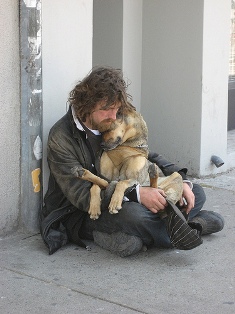Finding a Why To Bear a How: Life in a Time of Suffering

I would be remiss if I did not give at least one webpage to “Finding a Why To Bear a How: Life in a Time of Suffering.”
Fully one-fifth of the world lives in ABJECT poverty, to say nothing of relative poverty. Over one billion people are struggling to survive on less than one dollar a day.
This is a moral challenge. We have the money, the materials and the know-how – but we cannot see our way to benevolent self-interest, let alone compassion.
According the African business newsletter, www. businessafrica.net , the cost of waging the Gulf War of 1991 – a “small” war by comparison to the one in Iraq – is well over US $100 billion. And over $200 billion if you include the “collateral” damage of the Persian Gulf's oil pollution and the repairs of Kuwait's oils wells set ablaze by Iraq.
What a staggering waste of natural and human resources! According to the editor, Dr. B.M. Quenum, this amount of money – US $200 billion - could lift impoverished African countries from the "poverty league" of GNP US$ 300 / year to "bearable living conditions league" of GNP US$ 2,500 / year. (This represents US$ 200 million per year over a period of maximum 10 years.)
You and I need to understand that the major cause of violence and disease is poverty. At the same time you and I know that many people in the “developed” world are going to live their whole lives in desperate poverty. Is there a way - a why to bear a how - to live with dignity and purpose in a brutal and seemingly hopeless situation?
*****
Having never been poor or made to suffer, I do not have the qualifications to comment on this, so I am instead sharing with you the perspective of Dr. Viktor Frankl. In 1942 Frankl, his wife and parents and most of his family entered Auschwitz. He alone survived. During his enslavement, he understood his purpose to prevent despondency and suicide among his fellow inmates.
After the camps were liberated by the allies, Frankl wrote his book, “Man's Search for Meaning.” Here is a section from this book that is listed as "the ten most influential books in [the United States]."
Fully one-fifth of the world lives in ABJECT poverty, to say nothing of relative poverty. Over one billion people are struggling to survive on less than one dollar a day.
This is a moral challenge. We have the money, the materials and the know-how – but we cannot see our way to benevolent self-interest, let alone compassion.
According the African business newsletter, www. businessafrica.net , the cost of waging the Gulf War of 1991 – a “small” war by comparison to the one in Iraq – is well over US $100 billion. And over $200 billion if you include the “collateral” damage of the Persian Gulf's oil pollution and the repairs of Kuwait's oils wells set ablaze by Iraq.
What a staggering waste of natural and human resources! According to the editor, Dr. B.M. Quenum, this amount of money – US $200 billion - could lift impoverished African countries from the "poverty league" of GNP US$ 300 / year to "bearable living conditions league" of GNP US$ 2,500 / year. (This represents US$ 200 million per year over a period of maximum 10 years.)
You and I need to understand that the major cause of violence and disease is poverty. At the same time you and I know that many people in the “developed” world are going to live their whole lives in desperate poverty. Is there a way - a why to bear a how - to live with dignity and purpose in a brutal and seemingly hopeless situation?
*****
Having never been poor or made to suffer, I do not have the qualifications to comment on this, so I am instead sharing with you the perspective of Dr. Viktor Frankl. In 1942 Frankl, his wife and parents and most of his family entered Auschwitz. He alone survived. During his enslavement, he understood his purpose to prevent despondency and suicide among his fellow inmates.
After the camps were liberated by the allies, Frankl wrote his book, “Man's Search for Meaning.” Here is a section from this book that is listed as "the ten most influential books in [the United States]."
On Strength: Finding a Why To Bear a How - Viktor Frankl

As we said before, any attempt to restore a man's inner strength in the camp had first to succeed in showing him some future goal. Nietzsche's words, "He who has a why to live for can bear with almost any how," could be the guiding motto for all psychotherapeutic and psychohygienic efforts regarding prisoners.
Whenever there was an opportunity for it, one had to give them a why - an aim - for their lives, in order to strengthen them to bear the terrible how of their existence. Woe to him who saw no more sense in his life, no aim, no purpose, and therefore no point in carrying on. He was soon lost. The typical reply with which such a man rejected all encouraging arguments was, "I have nothing to expect from life any more." What sort of answer can one give to that?
What was really needed was a fundamental change in our attitude toward life. We had to learn ourselves and, furthermore, we had to teach the despairing men, that it did not really matter what we expected from life, but rather what life expected from us. We needed to stop asking about the meaning of life, and instead to think of ourselves as those who were being questioned by life - daily and hourly.
Our answer must consist, not in talk and meditation, but in right action and in right conduct. Life ultimately means taking the responsibility to find the right answer to its problems and to fulfill the tasks which it constantly sets for each individual.
Whenever there was an opportunity for it, one had to give them a why - an aim - for their lives, in order to strengthen them to bear the terrible how of their existence. Woe to him who saw no more sense in his life, no aim, no purpose, and therefore no point in carrying on. He was soon lost. The typical reply with which such a man rejected all encouraging arguments was, "I have nothing to expect from life any more." What sort of answer can one give to that?
What was really needed was a fundamental change in our attitude toward life. We had to learn ourselves and, furthermore, we had to teach the despairing men, that it did not really matter what we expected from life, but rather what life expected from us. We needed to stop asking about the meaning of life, and instead to think of ourselves as those who were being questioned by life - daily and hourly.
Our answer must consist, not in talk and meditation, but in right action and in right conduct. Life ultimately means taking the responsibility to find the right answer to its problems and to fulfill the tasks which it constantly sets for each individual.
Books and Video
Books
“Where Is God When It Hurts?: : A Comforting, Healing Guide for Coping with Hard Times”by Philip Yancey, Zondervan, 1997
“The Resilient Spirit: Transforming Suffering Into Insight and Renewal” by Polly Young-Eisendrath, Da Capo Press, 1997
Video
Interviews with Viktor Frankl – Watch All Three!
http://www.youtube.com/watch?v=9EIxGrIc_6g&feature=related
“Where Is God When It Hurts?: : A Comforting, Healing Guide for Coping with Hard Times”by Philip Yancey, Zondervan, 1997
“The Resilient Spirit: Transforming Suffering Into Insight and Renewal” by Polly Young-Eisendrath, Da Capo Press, 1997
Video
Interviews with Viktor Frankl – Watch All Three!
http://www.youtube.com/watch?v=9EIxGrIc_6g&feature=related
A man who becomes conscious of the responsibility he bears toward a human being who affectionately waits for him, or to an unfinished work, will never be able to throw away his life. He knows the "why" for his existence, and will be able to bear almost any "how." - Viktor Frankl
